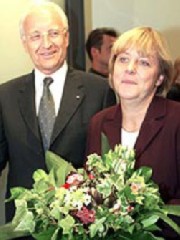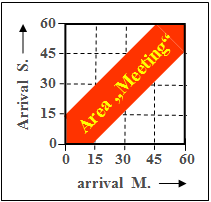Difference between revisions of "Aufgaben:Exercise 4.1Z: Appointment to Breakfast"
From LNTwww
m (Text replacement - "„" to """) |
|||
| (7 intermediate revisions by 2 users not shown) | |||
| Line 1: | Line 1: | ||
| − | {{quiz-Header|Buchseite= | + | {{quiz-Header|Buchseite=Theory_of_Stochastic_Signals/Two-Dimensional_Random_Variables |
}} | }} | ||
| − | [[File:P_ID245__Sto_Z_4_1.jpg|right|frame| | + | [[File:P_ID245__Sto_Z_4_1.jpg|right|frame|Chancellor candidates – breakfast in 2002]] |
| − | + | Ms. M. and Mr. S. are known to meet often for a joint breakfast: | |
| − | * | + | *Both promise to come to such a meeting on a certain day between 8 am and 9 am. |
| − | * | + | *Further, they agree that each of them will arrive in this period (and only in this period) on "good luck" <br>and wait up to fifteen minutes for the other. |
| Line 12: | Line 12: | ||
| + | Hints: | ||
| + | *The exercise belongs to the chapter [[Theory_of_Stochastic_Signals/Two-Dimensional_Random_Variables|Two-Dimensional Random Variables]]. | ||
| + | *Use the minute of arrival time as the time in the following questions: <br>"Minute = 0" stands for 8 o'clock, "Minute = 60" for 9 o'clock. | ||
| + | *The exercise arose before the 2002 German Bundestag elections, when both Dr. Angela Merkel and Dr. Edmund Stoiber wanted to become the CDU/CSU's candidate for chancellor. | ||
| + | *At a joint breakfast in Wolfratshausen, Ms. Merkel renounced. The later election was won by Gerhard Schröder (SPD). | ||
| − | + | ===Questions=== | |
| − | |||
| − | |||
| − | |||
| − | |||
| − | |||
| − | |||
| − | |||
| − | |||
| − | |||
| − | = | ||
<quiz display=simple> | <quiz display=simple> | ||
| − | { | + | {What is the probability $p_1$ that the two will meet when Mr. S. arrives at 8:30? Give reasons for your answer. |
|type="{}"} | |type="{}"} | ||
$p_1 \ = \ $ { 50 1% } $\ \%$ | $p_1 \ = \ $ { 50 1% } $\ \%$ | ||
| − | { | + | {Which arrival time should Ms. M. choose if she does not actually want to meet Mr. S., but still wants to keep to the agreement made? <br>What is the probability $p_2$ that Ms. M. and Mr. S. will meet? |
|type="{}"} | |type="{}"} | ||
| − | $p_2 \ = \ | + | $p_2 \ = \ $ { 25 1% } $\ \%$ |
| − | { | + | {Which arrival time should Ms. M. choose if she not only wants to avoid a meeting as much as possible, but also wants to minimize the waiting time? |
|type="{}"} | |type="{}"} | ||
| − | $\rm | + | $\rm minute \ = \ ${ 60 } |
| − | { | + | {What is the probability $p_4$ for a meeting in general, that is, if both actually appear on "good luck"? |
|type="{}"} | |type="{}"} | ||
| − | $p_4 \ = \ | + | $p_4 \ = \ $ { 43.75 1% } $\ \%$ |
| Line 51: | Line 46: | ||
</quiz> | </quiz> | ||
| − | === | + | ===Solution=== |
{{ML-Kopf}} | {{ML-Kopf}} | ||
| − | '''(1)''' | + | '''(1)''' If Mr. S. arrives at 8:30, he will meet Ms. M. if she arrives between 8:15 and 8:45. Thus the probability: |
| − | :$$p_1 = \text{Pr( | + | :$$p_1 = \text{Pr(Mr. S. meets Ms. M.)}\hspace{0.15cm}\underline{=50\%}.$$ |
| − | [[File: | + | [[File:EN_Sto_Z_4_1_d_neu.png|right|frame|"Favorable area" for meeting]] |
| − | '''(2)''' | + | '''(2)''' If Ms. M. arrives at 8 a.m., she meets Mr. S. only if he arrives before 8:15. |
| − | * | + | *If Ms. M. arrives at 9 a.m., Mr. S. must arrive after 8:45 a.m. so that they can meet. |
| − | * | + | *The probability of meeting is the same in both cases: |
| − | :$$p_2 = \big[\text{Min Pr( | + | :$$p_2 = \big[\text{Min Pr(Mr. S. meets Ms. M.)}\big]\hspace{0.15cm}\underline{=25\%}.$$ |
| − | '''(3)''' | + | '''(3)''' Of the two arrival times calculated in '''(2)''', 9 o'clock $(\underline{\text{Minute = 60}})$ is more favorable, <br> since she – if Mr. S. is not there – can leave immediately. |
| − | '''(4)''' | + | '''(4)''' The probability $p_4$ is given as the ratio of the red area in the graph to the total area $1$. |
| − | * | + | *Using the triangular areas, one obtains: |
:$$p_4=\rm 1-2\cdot\frac{1}{2}\cdot\frac{3}{4}\cdot\frac{3}{4}=\frac{7}{16}\hspace{0.15cm}\underline{=\rm 43.75\%}.$$ | :$$p_4=\rm 1-2\cdot\frac{1}{2}\cdot\frac{3}{4}\cdot\frac{3}{4}=\frac{7}{16}\hspace{0.15cm}\underline{=\rm 43.75\%}.$$ | ||
| Line 76: | Line 71: | ||
| − | [[Category:Theory of Stochastic Signals: Exercises|^4.1 | + | [[Category:Theory of Stochastic Signals: Exercises|^4.1 Two-Dimensional Random Variables^]] |
Latest revision as of 17:56, 22 February 2022
Ms. M. and Mr. S. are known to meet often for a joint breakfast:
- Both promise to come to such a meeting on a certain day between 8 am and 9 am.
- Further, they agree that each of them will arrive in this period (and only in this period) on "good luck"
and wait up to fifteen minutes for the other.
Hints:
- The exercise belongs to the chapter Two-Dimensional Random Variables.
- Use the minute of arrival time as the time in the following questions:
"Minute = 0" stands for 8 o'clock, "Minute = 60" for 9 o'clock. - The exercise arose before the 2002 German Bundestag elections, when both Dr. Angela Merkel and Dr. Edmund Stoiber wanted to become the CDU/CSU's candidate for chancellor.
- At a joint breakfast in Wolfratshausen, Ms. Merkel renounced. The later election was won by Gerhard Schröder (SPD).
Questions
Solution
(1) If Mr. S. arrives at 8:30, he will meet Ms. M. if she arrives between 8:15 and 8:45. Thus the probability:
- $$p_1 = \text{Pr(Mr. S. meets Ms. M.)}\hspace{0.15cm}\underline{=50\%}.$$
(2) If Ms. M. arrives at 8 a.m., she meets Mr. S. only if he arrives before 8:15.
- If Ms. M. arrives at 9 a.m., Mr. S. must arrive after 8:45 a.m. so that they can meet.
- The probability of meeting is the same in both cases:
- $$p_2 = \big[\text{Min Pr(Mr. S. meets Ms. M.)}\big]\hspace{0.15cm}\underline{=25\%}.$$
(3) Of the two arrival times calculated in (2), 9 o'clock $(\underline{\text{Minute = 60}})$ is more favorable,
since she – if Mr. S. is not there – can leave immediately.
(4) The probability $p_4$ is given as the ratio of the red area in the graph to the total area $1$.
- Using the triangular areas, one obtains:
- $$p_4=\rm 1-2\cdot\frac{1}{2}\cdot\frac{3}{4}\cdot\frac{3}{4}=\frac{7}{16}\hspace{0.15cm}\underline{=\rm 43.75\%}.$$

